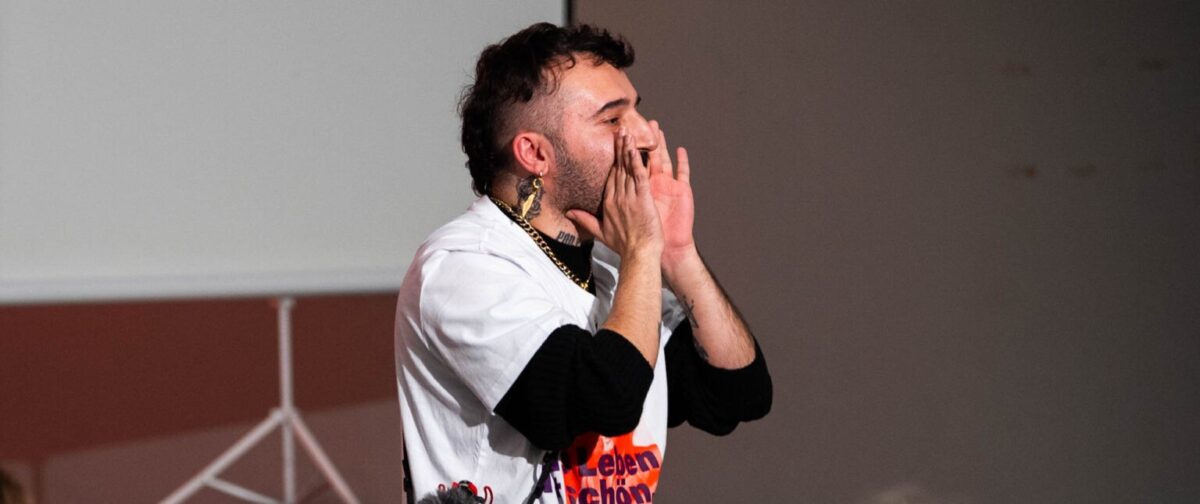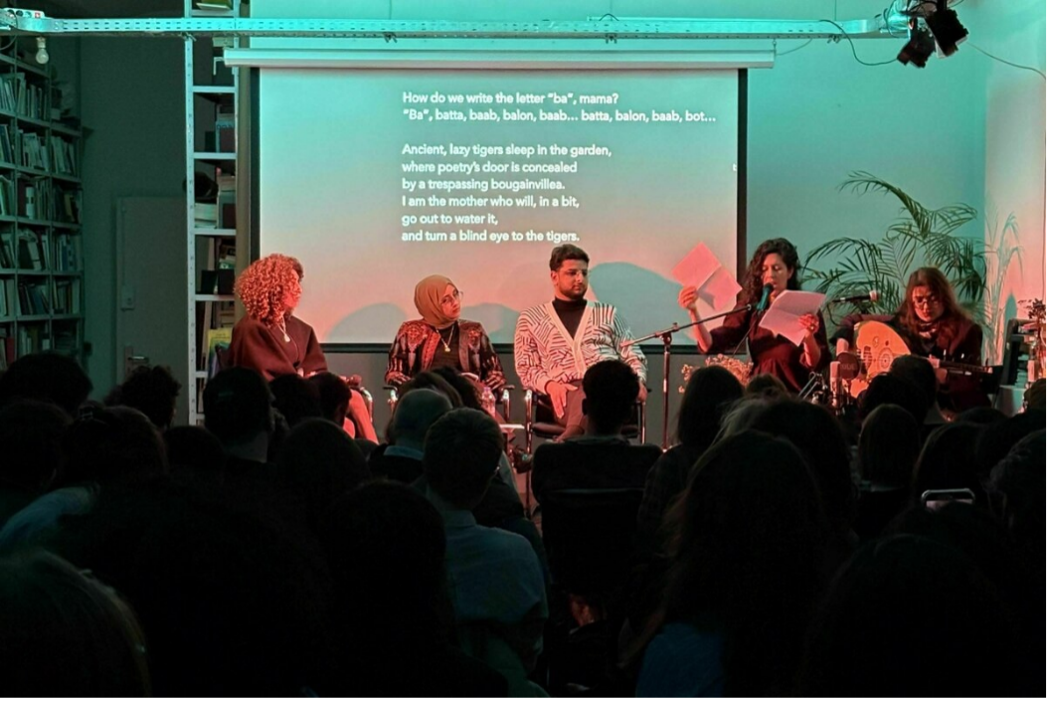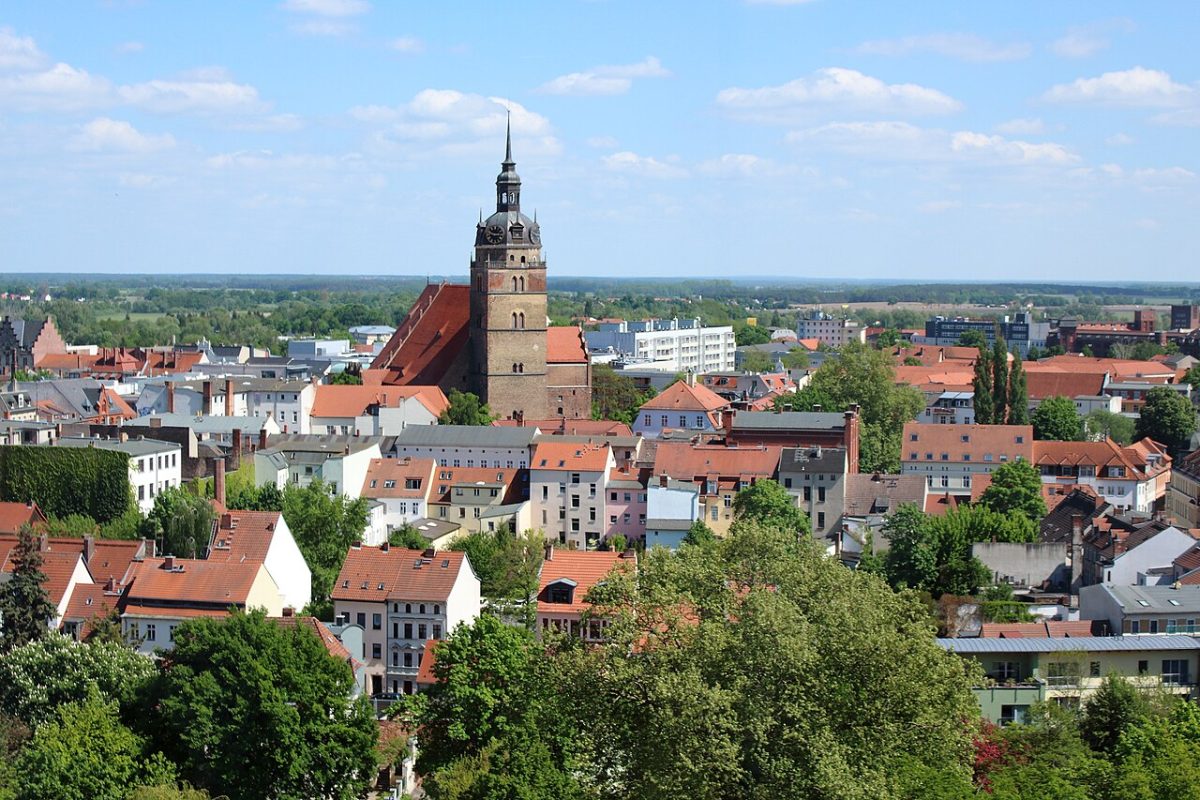Hi Christoph, thanks for speaking to us. Could you start by introducing yourself? Who are you and what do you do?
I’m an antifascist and leftist from Oldenburg. My love story with Palestine began 30 years ago. I was raised as a liberal Zionist. Today I’m a campaigner for the BDS campaign for Palestinian human rights, and co-initiator and activist plaintiff of the BT3P – an initiative that we started two years ago.
For people who haven’t heard of the BT3P, can you briefly explain why you set it up and what you’ve been doing since then?
BT3P stands for the “Bundestag 3 for Palestine”, and consists of Amir Ali from Palestine Speaks, Judith Bernstein from Jewish-Palestinian Dialogue group, and me – as the spokesperson of the BDS Initiative Oldenburg. While we are the plaintiffs, we also like to consider ourselves to be parts of a network of Palestinian, Jewish, German, (ex-)Israeli allies with roots in all kinds of intersectional struggles. BT3P is open to anyone to whom human rights and democratic freedoms truly matter and who stands up for Palestinian rights. But let’s get back to the incident that triggered it all:
In May 2019, the German parliament Bundestag infamously passed a resolution called “Der BDS Bewegung geschlossen entgegentreten” [“Resisting the BDS Movement with Determination”]. We consider this resolution both racist and undemocratic. Its main content slanders the Palestinian human rights campaign as antisemitic and calls on all state and municipality entities in Germany to deny us public space and funding of any kind.
Even before the resolution was passed, there was quite a commotion, politically speaking. More than 240 Jewish and Israeli intellectuals called on the Bundestag not to pass this travesty of a pseudo-law. But they did so anyway.
What we need to understand is that the Bundestag resolution is both the result of a Zionist hegemonial mindset and of anti-Palestinian racism in Germany and simultaneously an amplifier of these hateful ideologies. Our lawyer, Ahmed Abed, who is based in Berlin-Neukölln, had a crucial role in bringing us together. We all understood that the time had come to take the “Staatsräson” bull by the horns.
The Bundestag resolution on BDS is not a proper law. Is that of any importance?
There was an excellent article in der Spiegel quite a while ago, demonstrating how lobby organisations targeted parliamentarians individually and as groups to get this resolution passed.
The fact that “only” a seemingly innocent resolution was passed (instead of a proper law banning BDS) is not the result of sloppiness, but – in a Machiavellian sense – was well-crafted and strategically planned. According to a public statement issued by the scientific service of the Bundestag itself (Wissenschaftlicher Dienst) this resolution would be unconstitutional if it were a proper law.
The soft status of a resolution was chosen for two reasons: In a society with strong authoritarian roots and presence such as Germany, it amounts to a public character assassination when the Parliament condemns the movement you’re in. I’ve heard the phrase, “But even the Bundestag says that BDS is antisemitic,” more than once. Case closed. It doesn´t matter anymore how absurd its reasoning is, the state has spoken so you´d better obey. And secondly, they knew that a resolution would be more difficult to attack in the courts.
More difficult but not impossible?
Not only not impossible, but the opposite: very promising! We want to win this case and are cautiously optimistic about the ultimate outcome. Here is why: We can demonstrate in dozens of cases that the resolution was handled by municipalities and politicians as if it were a law, and one with disastrous effects on activists, international artists, journalists. I’m sure that many readers could quote more than one example themselves. Our statement of claim demonstrates this in depth, and also how in this resolution the state is turned (once again) into a semi-god dictating its will. That’s verfassungswidrig, unconstitutional.
What we perhaps consider even more powerful as legal argument is that international law is on our side: Five UN special rapporteurs have expressed their dismay over the Bundestag resolution, stating that it “unduly interferes with the right of the people of Germany to engage in political speech, namely, to express support for the BDS movement.“ French friends of ours were taken to court for alleged hate-speech after handing out BDS leaflets in front of an Elsassian supermarket- and they ultimately won their case against the Republic of France! (European Court of Human Rights, Baldassi and Others vs. France, 2020).
Likewise, our own statement of claim has legal expertise attached to it, which underlines the fact how well-founded in international law our case is. This expertise was penned by four legal scholars, among them Professor Richard Falk, former UN special rapporteur on the situation of human rights in the Palestinian territories occupied since 1967!
The defence of the Bundestag, in contrast, is mere legalese trickery with no substance to it whatsoever. Let´s see who will win.
Why is fighting the Bundestag resolution still of relevance today?
Following a whole series of legal wins on local levels, the Zionists have turned a little quiet over the Bundestag resolution recently, but it’s still forming the opinion of decision makers on all kinds of levels. Some people might argue, “So what? You´re winning in the courts, so everything is fine and dandy, no?” It´s not. We cannot tolerate a situation in which we as human rights activists need to fight a legal battle for every single event we want to hold while politicians can throw racist slurs at Palestinians at pro-Israeli rallies while Gazans are bombed to smithereens.
Do you think this is specific to Germany Or are there links to be made with similar attacks on Palestinian and their supporters in other countries?
Research by the Israeli newspaper Ha’aretz shows that the Israeli state gave $1.1 million to international law firm Sidley Austin with the objective of smearing BDS activists in public.
These anti-BDS resolutions are obviously efforts to counter our movement in a situation where we have the facts, the popular opinion and the political compass, while Israel has the guns and tanks, and is supported by most governments all over the world. This is not only true for Germany, although many consider Germany to be one of the fiercest battlegrounds.
Let’s look briefly at three European countries: Austria passed an anti-BDS resolution in 2020 following in the steps of the Bundestag. Two other examples are France and Britain: France, as far as I know, does not have a specific anti-BDS law, but they are applying existing laws to target BDS activists – in vain as we have seen above. In Britain, there have repeatedly announcements been published by government politicians saying that they are going to pass an anti BDS law soon. They are aiming for a proper law.
It’s not a perfect picture, but in a way, we are in between the French case and the possible future British law. We know that both lawmakers and Zionist spin doctors are eagerly watching our case to see what’s happening. Given the dominant role that Germany unfortunately has in the EU, it is even worth considering that the fact that not more countries have followed Big Brother yet might be a result of our legal intervention. If we manage to bring down this law in Germany, then the likelihood of other such laws and resolutions being successfully targeted under international law is very high.
In Germany, we’ve now had just over a year of a so-called Traffic Light Coalition. A couple of government ministers have – privately at least – said they support Palestinian rights. Has the new government made any changes which affect the BDS law?
Please do introduce me to government ministers who support Palestinian rights! I haven’t heard from any of them! Coming back to your question:
The new government has not yet spoken explicitly about this case or the BDS movement in public.
Angela Merkel once famously spoke to the Israeli parliament, the Knesset, about German commitment to the safety of the state of Israel and referenced to that as “Deutsche Staatsräson“. Even before that, it is clear that the main aim is to shield the state of Israel from any form of criticism, let alone follow up with sanctions.
From the far right AfD to the supposedly left DIE LINKE, the German party leaders firmly stand with the Staatsräson. So, no- there was no change for the better and we didn’t expect any.
This includes harsh criticism of DIE LINKE. Can you back that up?
For obvious reasons, we are targeting the one resolution that got passed with the votes of CDU/CSU, SPD, Greens, FDP. But initially there were three drafts presented in the Bundestag. The first by the AfD was proposing a proper legal ban of BDS. The majority could not agree to that for two reasons: a) because they don´t want to be associated with the AfD too obviously, b) because they knew that such a law could be sacked easily. The third draft was issued by DIE LINKE. The mildest statement you can make about it is that it’s extremly contradictatory. It refers to the UN resolutions as a solid base for a peaceful solution in Palestine/Israel, and then goes on to reject the BDS movement, which is based in its entirety on those very UN resolutions!
Not one lawmaker in the entire Bundestag, including DIE LINKE, stood up to defend Palestinian human rights and BDS. The very title of the Linke´s draft was “Rejecting the BDS movement” and in its text they double down on the lie that BDS was per se targeting “Israeli citizens of Jewish faith”, i.e., acting antisemitic. In this sense and regarding that topic, DIE LINKE was and is part of the wall-to-wall Parliamentary consensus that Palestinians may not strive for the human rights they are entitled to without being smeared antisemitic and excluded from the public.
We know who our comrades inside the party are, but we and they must face the fact that none of their efforts has been successful. No matter how delusional, the party leaderships is striving for coalition capability. And they know that this cannot be achieved without endorsing the Staatsräson regarding Israel.
How is the BT3Pcampaign going now? Are you winning?
We lost the first court session public hearing at the administrative court. We are not too worried about this. Why? We, and I as an individual, have charged municipalities and others on several occasions for breaching basic democratic rights. And in 95% of the cases, we lost at the first stage as these administrative courts usually go with the administration and whatever they decide.
This is in contrast to the higher appeal courts which do grant importance to basic democratic rights. We usually win in this second stage of the public hearings.
In our humble opinion, this is a very strong case with concrete examples based on German and international law, supported by some of the highest authorities in the field. The next hearing has been announced by the Higher Administrative Court Berlin-Brandenburg for spring/summer 2023. Please join us if you can!
I’ve recently been covering the case of sacked Palestinian journalist Farah Maraqa who recently won on all counts. Could it be that the German legal system is currently more progressive on Palestine than German politics?
This is an interesting question. In many regards, I would say yes. I think that the legal system, generally speaking, feels still bound to democratic freedoms, which are no longer defended by the political elites and leading politicians and parties.
I see the whole thing that we are doing, as embedded into the general struggle for securing whatever democratic rights we have had in the State. In many ways, it’s about defending or even enlarging our power.
On Palestine, once the state is in a position where it can more easily target leftist and internationalist activists, it will do so even worse than it’s doing now. That’s one of the aspects why the BDS struggle is important, because if we let them get away with this, they will build on this, and target activists -be it for the Kurdish cause or against the ecocide- in an even more destructive way. We need to understand that our struggles are connected.
You’re now trying to organise a “Parlamentsseminar” in the Bundestag. What do you hope to achieve and how likely are you of succeeding?
The basic menu of such seminars includes being shown around in the Bundestag, having an introduction explaining the mechanisms of how for example, laws are made. And then the group of participants meet with members of every fraction of the Bundestag to discuss a political issue by their own choice.
We are group of about 50 activists, scientists, students, artists including our friends from Palestine Speaks and Jewish Voice- applied for the seminar under the title “The present position of the Bundestag fractions and the Federal Government on the BDS movement”. In the application attached we are not mincing words.
We want to challenge them: we want to sit face to face to them and find out for example, if this resolution still has still any legal meaning? Do they still support it? How do they justify to trample on Palestinian human rights?
We have an opinion poll running on our twitter account posing the question whether the Bundestag will accept or decline our application. The “Nay” fraction is ahead with 96%… do we share this assessment?
We are creating a lose-lose situation for the Bundestag politicians and a win-win situation for the movement: If they let us have the meeting, they will contradict their own resolution and we will speak truth to power inside the parliament. If they decline, we will dissect their arguments in public and deliver them the shame they deserve, plus: this will be useful to demonstrate in court that the Bundestag still silences human rights activism in Germany.
If people want to help with the seminar or support the BT3P, what can they do?
There are various ways to strengthen this cause. We thank all the people who have generously donated in the past and invite you to share some euros with us if you can. We are in for a legal battle that might last on for several years.
Supporters have also come to our first public hearing in Berlin, even though, unfortunately, they were denied to enter the court for reasons due to the pandemic. Hopefully this will be different next time! Others have helped with media work, photographs, videos. You know who you are – thank you!
We said it straight from the beginning: this is not solely a legal case, but it should be a call for unification of all activists and sympathisers. If you are sympathetic with human rights, if you are standing with the oppressed, then this is for you. So, we are open to your ideas on how to broaden this campaign. We are happy to speak at events or panels. The BT3P initiative is a powerful tool for all of us!
Contacts and donations can be made via our homepage, via the email address team@bt3p.org, and via our Twitter account. Next step: please amplify the political commotion regarding the seminar application that´s going to happen in the next few days!




